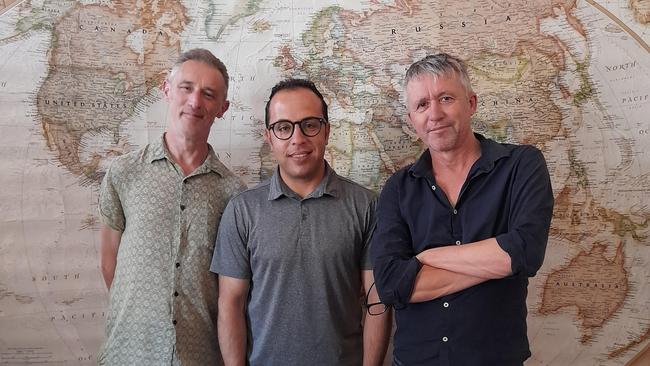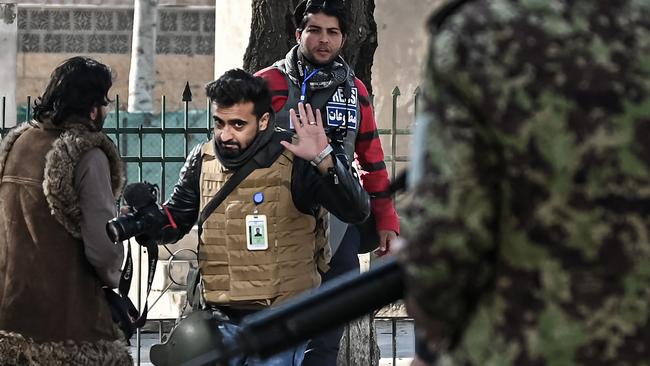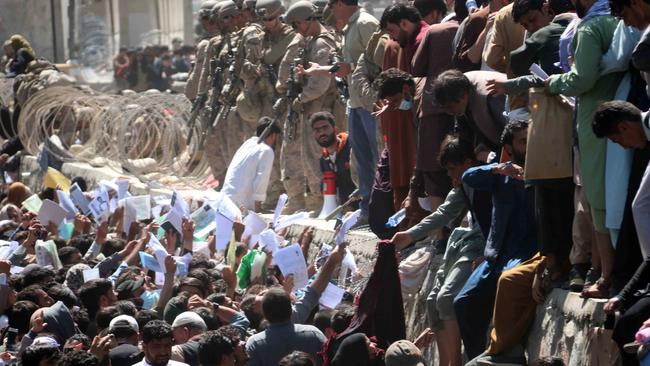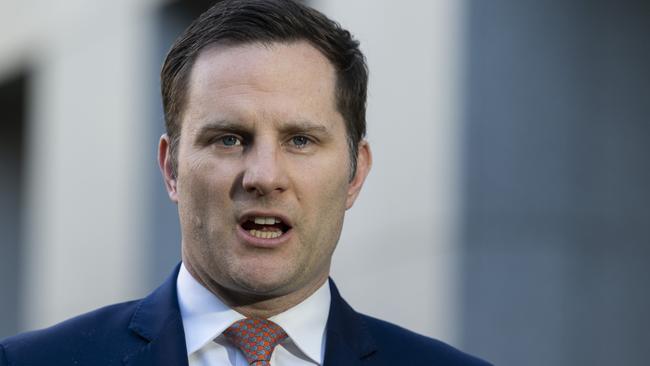‘Please help, I need to get out’: how the Oz’s cricket writers saved an Afghan journalist
An email from an Afghan journalist to Gideon Haigh and Peter Lalor led to a remarkable bipartisan effort to save the young man from the Taliban.

There was no TV and not much radio in the Afghan village where a young Mustafa Qamari was raised.
But there was cricket.
“I was thirteen years of age,” he says, of the first time he saw Pakistani refugees playing the game. “We don‘t have access to hear the cricket commentary, but they came to the village and played.”
Like so many boys before him, Qamari soon found himself smitten. He had no way of knowing that his burgeoning love for game – and, in time, the friendships he would forge across the world, with two cricket writers from The Australian, Gideon Haigh and Peter Lalor – would one day save his life.
In a special episode of The Weekend Australian’s “Cricket, Etc” podcast today, Qamari, 27, says he worked hard as a young man to become something unimaginable to his parents: a sports journalist, reporting cricket for some of Afghanistan’s fledgling media organisations, including an AfghanYouth TV.
He watched whatever footage he could find of the cricketing greats, and dreamt about travelling to see the game played elsewhere.
Maybe one day, he would even see the MCG?
But then last July, the Taliban arrived in the province in which Qamari was living. Dozens of media organisations, including those staffed by women and broadcasting sport, were forced to close.

In the chaos that followed, some journalists were taken by force from their homes, and some were killed.
Fearing for his safety, Qamari, who was then just 26, went into hiding. He also began reaching out to foreigners, asking for help. His approach lacked precision, but then, he was desperate. One example: a Queensland retiree, Andrew Holmes, tells The Weekend Australian that he received a message completely out of the blue on 20 August 2021 “that a Mustafa had ‘followed me’ on Twitter.”
“On Twitter, you can follow anyone you are interested in for whatever reason,” Mr Holmes says. “I had the option to ‘follow back’ or ignore. Normal practice is to checkout their profile, then decide if it’s spam or similar. In Mustafa’s case, he had photos but the text was Arabic so I could not ascertain who or what he was.
“Certainly, I did not know he was Afghan. I would normally ignore but something made me think that I should follow back and so I did. Curiosity perhaps? This allowed Mustafa to DM (direct message) me.”
His first message was simple: “Hello! Respected Andrew … This is Mustafa Qamari, one of the Afghan sports journalists. Dear sir, could you please advise me how to apply for any visa program. My life is in risk here in Afghanistan, every night Taliban come to our home and ask about me … Please help.”

He attached several photos, showing a young man in a polo shirt, with sporting lanyards around his neck.
Holmes decided to research Australian government policy on refugees, confirming in the process that Qamari’s best bet might be a humanitarian visa. He sent the forms he had to complete “by printing and signing, then scanning back. In a war zone! Ridiculous.” But it turned out that Qamari did not meet the criteria for a humanitarian visa (at that point, the category was open mainly to young women, children, and employees or ex-employees of the Australian government.)
Yet the situation was dire. The Taliban had by now taken control of the whole country. What was Qamari going to do?
Well, swing for the boundary, of course.
Because haven’t we all needed a six from the final ball at some point?
Like many cricket tragics around the world, Qamari knew something about The Australian’s lively “Cricket, Etc” podcast, hosted by this newspaper’s cricket writers, Peter Lalor and Gideon Haigh.
On 24 August, he sent an email through the website, introducing himself, and saying: “I’m in trouble. I need to get out.”
“If someone contacts you out of the blue like that, and they need your help, well, it‘s pretty hard to pass by,” says Haigh.
So began a truly bipartisan effort to uplift a young cricket journalist – somebody the Australian cricket writers had never met – from Afghanistan before harm could come to him.
Haigh says thousands of emails were sent, and hundreds of calls were made in the weeks that followed, with a motorcycle courier dispatched to shuffle all the necessary documents through various portals, mostly under the cover of darkness.

He says the Greens senator, Nick McKim; Bronwyn Archer from GAP legal services, who became Mustafa’s lawyer; and “the remarkable Kay Danes, who has transported all kinds of people out of the world‘s trouble spots” worked around the clock to get Qamari’s paperwork in order.
Finally, all they needed was for Alex Hawke, Minister for Immigration, Citizenship, Migrant Services and Multicultural Affairs, to come to the party.
Would he do it?
Yes, he absolutely would.
Qamari stayed in hiding until the final day. Then, on 15 October, he made an emotional post to Twitter.
“To leave home is to break your own heart,” he wrote, beneath a photograph of himself standing on a tarmac with a bag by his feet. “Today, I landed in Australia and fortunate being to call it my new home for dreams to come true. Grateful to the Australian Govt and its people for their bounty and helped me with distinguished etiquette to get out me from Afghanistan.”
Welcome … everything is possible in Australia … make the most of your connections and opportunities… Afghanistan will always be in your heart. Wishing you good health, happiness and prosperity. https://t.co/9FmA6JpOJo
— Poppy Masselos (@poppymasselos) October 18, 2021
On the Cricket, Etc podcast today, Qamari says his exit from the war zone would have been “impossible” without his new friends, adding: “The Australian Government and the Australian people … I will never forget their humanity act.”
love meeting new friends. I have been so lucky to meet some of my closest friends on set like #GideonHaigh and @plalor. Anything is possible when you have the right people there to support you. Your friendship means the world to me. Just wanted to let you know. pic.twitter.com/9bzlihdSZs
— Mustafa Qamari (@MustafaQamari23) December 24, 2021
The three writers had an emotional catch-up of this week’s Boxing Day Test, during which they posed for a photograph in front of a map of the world at Haigh’s place, in Carlton.
“I have been so lucky to meet some of my closest friends … Anything is possible when you have the right people there to support you. Your friendship means the world to me.”
Qamari is living now in Melbourne. He is not yet able to work, although that will happen soon. He is shy but has made a few friends and watched quite a bit of cricket.
The main thing: he is safe.
The situation in Afghanistan remains grim. UNHCR reports this week that famine looms for millions. A local charity, Batting for Afghanistan, will host a fundraising event, How’z That!, ahead of the Sydney Test on 4 January. Haigh and Lalor will be there, along with former England captain Mike Atherton, and former Australian captain Ian Chappell, each of whom is likely to be have quite a bit to say about The Ashes. There are a few tickets remaining from the venue website: www.willietheboatman.com.
You can hear the Cricket, Etc podcast featuring Mustafa Qamari here.




To join the conversation, please log in. Don't have an account? Register
Join the conversation, you are commenting as Logout